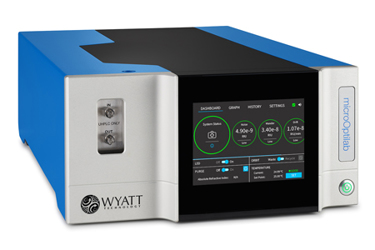microOptilab™ Universal Detection For UHPLC And SEC-MALS

Independent of chromaphores or fluorophores, differential Refractive Index (dRI) detectors measure concentrations of all types of samples in almost all solvents. The microOptilab™ brings the universal detection capabilities, unsurpassed concentration range, and superb sensitivity and linearity – familiar from the Optilab® – to the domain of UHPLC.
SEC-MALS with UHPLC
Like standard SEC, UHPLC-SEC analysis relying on column calibration with molecular standards is unreliable when the standards do not accurately reflect your samples in terms of conformation, non-ideal (e.g., hydrophobic) column interactions or reversible association. SEC-MALS employs a microDAWN® MALS detector downstream of the SEC column and UV detector, to determine molar mass / molecular weight distributions of macromolecules independently of column calibration.
Refractive index detection is an important component of any SEC-MALS system, and necessary for analyzing conjugated proteins or polymers devoid of chromaphores. The microOptilab connects with the microDAWN MALS detector for a complete UHP-SEC-MALS setup that transfers the many benefits of SEC-MALS analysis to the realm of UHPLC.
Key benefits
- Very low band broadening, < 4 µL, to maintain the resolution of very narrow UHPLC peaks
- Extraordinary dRI measurement range, -4.7 x 10-3 to +4.7 x 10-3 RIU (comparable to 25 mg/mL protein in PBS)
- Highly sensitive, ± 1.5 x 10-9 RIU across the entire measurement range
- Measures solvent refractive index, require for MALS calculations
- Measures at the same wavelength as the MALS detector, for maximum accuracy in MALS calculations
- Temperature range 4 °C to 65 °C for proteins and polymers that require a range of temperatures
- High-resolution, touch-screen front panel displays data graphs and instrument diagnostics, even with the host computer turned off
Unparalleled features
Considering the extremely small peak volumes of UHPLC, band broadening in the microOptilab is kept to the absolute minimum, at less than 4 µL, as compared to 20 - 40 µL or more for standard RI detectors. As a result, the superior resolution from UHPLC columns and instruments will not be compromised with the microOptilab RI detector.
Even though the microOptilab offers a dRI measurement range orders of magnitude beyond that of other UHPLC dRI detectors, unlike other detectors there are no range or gain settings in the microOptilab. The full range of instrument detection is always present, and the full sensitivity exists over the entire range. The small flow cell and proprietary temperature regulation enable stable RI baselines and signals which further enhance the detector's sensitivity.
Unlike all other dRI detectors, the microOptilab also measures absolute refractive index in order to determine solvent RI, necessary in light scattering calculations and useful in assessing the accuracy of mixing of solvent gradients.
The microOptilab can be operated below ambient temperatures as easily as above ambient. No hassle temperature control can be programmed down to 4 °C or as high as 65 °C.
The microOptilab is compatible with all UHPLC systems.
